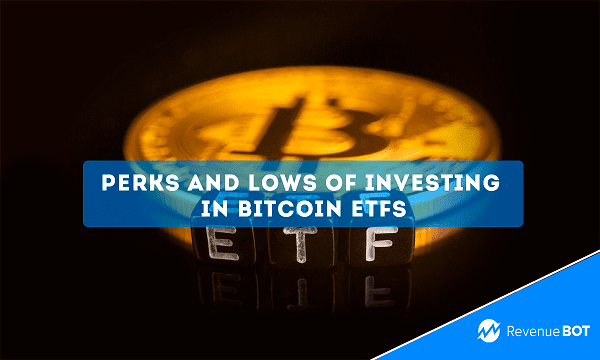
Over the past few years cryptocurrencies (not to mention Bitcoin) have caught the eye of investors and financial institutions across the globe. First perceived as a niche industry, crypto has become a powerhouse in the world of investing, capturing the attention of every strata of the community.

As BTC kept surging in popularity, it dawned on everyone that ETFs (short for exchange-traded funds) could be a centrepiece in this context. Investors are hotly debating the concept of recent origin, looking at its potential benefits and impact on fast-paced markets. In this article, we will delve into the specifics of this market development and analyze how Bitcoin ETFs could reshape the way global financial investments work.
What exactly is Bitcoin ETF?
Bitcoin ETF is basically an exchange-traded fund designed to track the price movements of Bitcoin. An ETF in turn is an investment vehicle that allows ordinary investors to gain access to price fluctuations without directly owning the cryptocurrency itself.
Instead of investing directly in BTC, you’re buying shares in a fund that holds bitcoin, or you can do it through traditional financial instruments such as an exchange. You can buy and sell shares (also called ETFs) on an exchange in the same way as other types of stocks. Such an approach facilitates investing in the alpha cryptocurrency for those who opt for using traditional investment vehicles rather than directly owning Bitcoin.
Bitcoin ETFs can keep track of the BTC value using physical assets, or by leveraging financial derivatives such as futures and options.
Pros of investing in Bitcoin ETFs
This activity offers a wide range of advantages, especially for individual investors seeking to incorporate crypto into their portfolio without purchasing it straight away. So the main benefits are as follows:

- Ease of access: Bitcoin ETFs simplify the investment process tremendously by enabling investors to purchase shares using regular brokerage accounts. For those who are reluctant or unable to dig into the technicalities of crypto exchanges, this one is especially helpful. Skilled stock traders can effortlessly integrate Bitcoin ETFs into their portfolios, bypassing the hassles around private keys and digital wallets.
- Regulatory oversight: transactions here are now closely monitored by financial watchdogs, thus maximizing the level of your protection. Both the Bitcoin Futures ETF approval back in 2021 and the now-adopted Spot Bitcoin ETF – all done by the SEC – happened to be milestones towards creating a trustworthy investment environment.
- Diversification: ETFs provide a new asset class, helping to broaden your portfolio. By including them, it may aid in risk distribution, as Bitcoin typically exhibits a low correlation to conventional assets such as stocks and bonds. At times when traditional markets are volatile, the bitcoin value can wobble wildly, delivering investors protection against a potential market collapse.
- Liquidity: ETFs typically offer more liquidity than direct investments. This implies that investors can easily buy and sell stocks at real-time market rates. Higher liquidity is crucial for being able to react quickly to market shifts, especially in times of extreme volatility.
- Tax efficiency: Investing in Bitcoin ETFs can be more tax-efficient since this financial instrument is often subject to a special tax treatment. For instance, some jurisdictions have more favorable tax rules for ETFs, thereby avoiding tax events related to the realization of capital gains until the investment is sold. This is unlike a direct investment in bitcoin, where tax liabilities may arise when the crypto is sold or exchanged.
What about the cons?
Along with the many benefits of investing in Bitcoin ETFs one becomes aware of certain downsides that are worth considering in the context of financial decisions. In this regard, let’s explore the following disadvantages:
- Extreme volatility: as you already know, Bitcoin and its ETFs are prone to price fluctuations. Abrupt price swings over a short period of time, like the value dropping by more than 10% in a single day, might seem alarming to investors, especially to those who are not habituated to such events.
- Substantial market risk: purchasing Bitcoin ETFs entails accepting the security-related and regulatory risks typical of the cryptoverse. The crypto market is still in its infancy and is steadily evolving, facing regulatory challenges in various jurisdictions.
- Fee structures: Compared to traditional non-Bitcoin ETFs fees, the bitcoin ones can be higher. Maintenance and protection costs for the underlying crypto assets may serve as a reason to justify these additional fees.
- Indirect ownership: investors who purchase Bitcoin ETFs do not actually hold bitcoins. They are simply investing their bitcoin assets in a fund that manages these shares, thus you are missing out on some of the benefits of direct ownership, such as being able to transact and store your funds without intermediaries.
- Tracking error: the performance of a Bitcoin ETF and actual market performance may vary a lot. This type of malfunction occurs due to fund expenditures, the ways how Bitcoin exposure is obtained (such as through futures contracts), as well as due to the interval between market trades and fund rebalancing.

As a result, tracking error measures the divergence between the performance of an investment portfolio or fund and its benchmark index, indicating the effectiveness of the fund manager in replicating the index’s returns.
Conclusion
To wrap it up, investing in Bitcoin ETFs certainly offers some unique opportunities and irresistible prospects for a broad spectrum of investors. That said, similar to any financial instrument, there also exist a number of perils that should be carefully considered.
